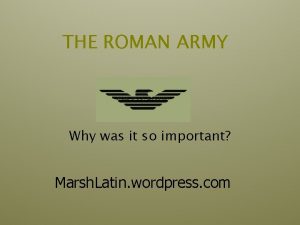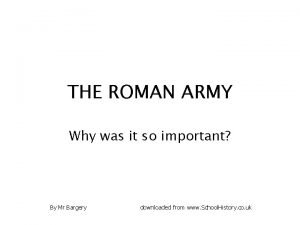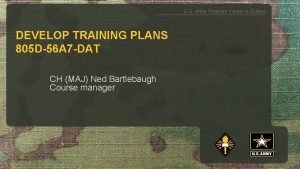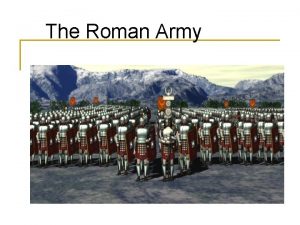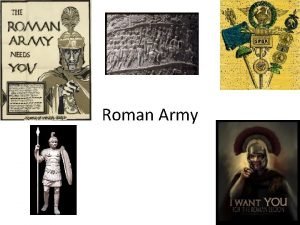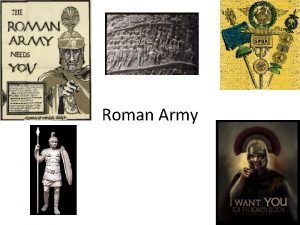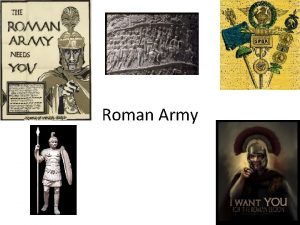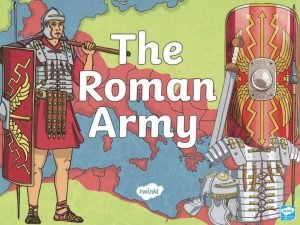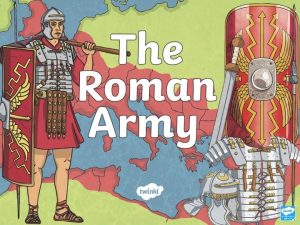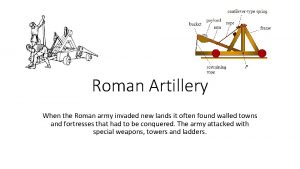An Army Like No Other The Roman Army















- Slides: 15

An Army Like No Other: The Roman Army: The Roman Legions The Roman Legion Military Training: The Art Of War The Roman Navy

The Roman Legion Army was comprised of professional soldiers who were Roman citizens Pay and retirement prospects entice enlistment Non-citizens were promised citizenship after 20 years of loyal service Also received choice of land or money when soldiers retired

The Roman Legion Roman soldiers swore loyalty to Rome and emperor Loyalty to emperor was reinforced through holidays recognizing emperors Men who served were in fact loyal to Rome and its ideals

The Roman Legion A legion was made up of 5, 400 -6, 000 men Centurion commanded 80 men (century) A cohort was made up of 6 centuries (480 men) 10 cohorts made a legion that was supported with a cavalry unit and engineers Majority of legions protected Roman frontier (borders)

The Roman Legion Emperors had to work at maintaining loyalty of army Officers received appointments through the emperor (received prestige, status, connections and wealth) Generals were moved like chess pieces within empire to avoid loyalty from men Men more loyal to leadership than emperor

Military Training: The Art Of War Military training was rigorous and involved marching and military training Extensive training in various weapons and formations Responsible for constructing forts, bridges, roads and protective walls Maintain constant presence in conquered territories

Military Training: The Art Of War The army was oppressive in territories and carried out numerous massacres populations of civilians Enslaved enemies who were sent back to Rome Generals benefited from slave auctions through connections

Military Training: The Art Of War Auxiliaries were men from conquered territories who received similar training like Romans Majority served as archers or as horse archers Granted citizenship after 25 years and were paid lower wages than Roman troops Stationed in along frontiers away from home countries

Military Training: The Art Of War Roman ballista were heavy weapons that launched stone balls, large arrows and multiple arrows Used for sieges and protection of fixed positions also found on naval warships Julius Caesar introduced them during invasion of Britian 55 B. C.

The Roman Navy Main responsibility was to combat piracy and support army operations Protected seas travel by Roman vessels Comprised of warships, transports and smaller ships Triremes was main warship based on a Greek design

The Roman Navy did not have slaves rowing oars All were soldiers and were recruited roman citizens and/or freemen Had marines who boarded enemy ships The total strength of 40, 000 men

The Roman Legion Cavalry units were called milliaries that consisted of 800 men Auxiliaries were not equipped like regular cavalry Cavalry had variety of weapons Javelin Spears Lance Shields Bow

Roman Defeats and Victories Battle of Lake Trasimene 217 B. C. Hannibal lure’s a Roman army into ambush trapping them between Hannibal’s army and a lake 30, 000 killed Battle of Cannae 216 B. C. Rome loses 50, 000 men to Hannibal’s feint which led to them being surrounded and crushed


Roman Defeats and Victories Battle Of Zama 202 B. C. Scipio Africanus takes out Hannibal’s elephants by funneling them through his formation and killing 20, 000 men
 Difference between roman republic and roman empire
Difference between roman republic and roman empire Roman republic vs roman empire
Roman republic vs roman empire Led first roman army to britain
Led first roman army to britain Roman army structure
Roman army structure Join the roman army
Join the roman army Roman army recruitment poster
Roman army recruitment poster How was the roman army organised
How was the roman army organised How was the roman army organised
How was the roman army organised Roman army recruitment poster
Roman army recruitment poster Army central army registry
Army central army registry Self initiated other repair
Self initiated other repair Haagen daz slogan
Haagen daz slogan Halloween falls on october 31 every year.
Halloween falls on october 31 every year. Hát kết hợp bộ gõ cơ thể
Hát kết hợp bộ gõ cơ thể Lp html
Lp html Bổ thể
Bổ thể






